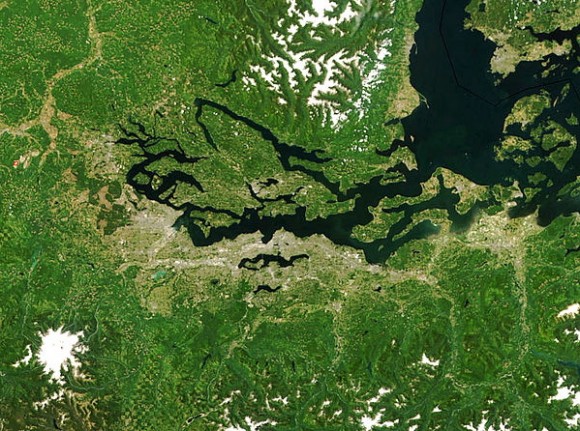
The Beginning of Regional Food Governance?
by: Puget Sound Regional Council Posted on: June 25, 2012
Photo: “Fawn Peak Complex Fire, Washington”, NASA Visible Earth Collection
By Alon Bassok, Senior Planner, and Olivia Robinson, Regional Affairs Coordinator, Puget Sound Regional Council
Editor’s Note: Learn about the Regional Food Policy Council. Encompassing four-counties in the Puget Sound, the Council has been assembled to confront the challenges facing their food system.
In September 2010, the Puget Sound Regional Council (PSRC) convened the Regional Food Policy Council, and since then has been working to address food system issues in the central Puget Sound region, which includes King, Pierce, Snohomish and Kitsap counties. The Regional Food Policy Council offers an innovative four-county approach to preserving viable agricultural land in the central Puget Sound region, strengthening distribution and marketing opportunities for farmers, improving public health, and increasing access to fresh, local food. The Regional Food Policy Council works with agriculture, business, community, and government partners to identify issues related to the region’s food system; develops integrated policy recommendations and actions that help strengthen underserved and at risk farmers; and ensures that food policy issues are included in regional planning.
There are multiple challenges that face the region’s food system. Farmland preservation is one of the most pressing concerns in the region, especially in response to development pressures. The difficulty of balancing the needs of working farms with environmental protection also poses a challenge for our food system. In addition to protecting land from development, there are ongoing concerns about the aging farmer population, infrastructure needs to support agriculture, the market challenges faced by farmers, as well as creating local – context-appropriate – regulations for agricultural activities.
Challenges to the regional food system do not stop at the farm. There is a need to invest in processing, distribution networks and food hubs, and to support local producers through marketing. Marketing itself needs to be broader than an advertising campaign. It needs to educate policy-makers and the broader public on the value of locally produced food and generate programming that may create lasting impacts, such as teaching schoolchildren about farming.
As conditions for bringing local foods to market improve, the central Puget Sound region, like many other parts of the nation, faces the further challenge of sustaining an equitable food system that considers food system worker wages and rights, and the availability of healthy, affordable foods for communities that currently do not have access to them.
The Regional Food Policy Council is working on multiple tracks to address the barriers and challenges within the food system. The council currently is developing a policy landscape map that will lead to the development of model food policies for local jurisdictions. The policy landscape map will catalog government policy-making and include information on decisions made by businesses and institutions that impact the food system. Once the policy landscape map is completed, the Council will begin to develop recommendations on specific issues for decision-makers.
In addition, the council currently is pursuing a number of other projects to tackle issues that have tangible solutions. For example, the council is conducting research on local meat production. If we can increase local meat processing capabilities, the council can make the link between the supply of meat that leaves the region and the unmet demand for locally produced meat.
Finally, the council is developing education strategies and materials that will allow council members and staff to share the work being done by the council with elected officials and the public throughout the central Puget Sound region. Although the council has met for just over a year, there is incredible support and enthusiasm for the work from council members and interested parties.
For further information, please contact Olivia Robinson at orobinson@psrc.org or visit http://www.psrc.org/about/advisory/regional-food-policy-council/
One Response to “The Beginning of Regional Food Governance?”
Articles On Dirt
Dirt: Dirt
- Mar 6 Re-Imagining Local Public Space, From Parks to Post Offices
- Nov 7 Google Cache Snapshot-Oregonlandco.com, 9/15/13
- Nov 7 Testimony
- Nov 7 Sustainable Forestry Initiative Confirms
- Sep 8 Why Label Genetically Modified Food?
- Sep 8 Why Not Label Genetically Modified Food?
- Sep 8 When Industrial Slaughterhouses Are Proposed
- Aug 8 ¡HUELGA! Mixteco and Triqui Farmworkers commence second Work Stoppage at Sakuma Brothers Farms, Inc.
- Aug 8 Bolivia: Building Resilience To Climate Change Through Indigenous Knowledge – The Case Of Bolivia
- Jun 8 A Conversation about School Lunches, a Student and a Farmer
- Oct 21 On Kids and Food
- Sep 30 Empowered Latino Farmers (Spanish & English Translations Included)
- Sep 16 Whatcom Farm-to-School: Tackling Food System Challenges One Lunch at a Time
- Aug 10 Sludge, Whose Jurisdiction? (Part 2)
- Jul 30 Sludge, Whose Jurisdiction? (Part 1)
- Jul 9 Rethinking the Peasant
- Jun 25 The Beginning of Regional Food Governance?
- May 29 Urban and Suburban Agriculture Empowers Environmental Stewards
- May 13 Northwest Soil Science: Nitrogen Mineralization
- Feb 3 WA Conservation Districts: An Introduction
- Jan 20 Planning For A Future: Protecting The Ground
- Jan 12 Recirculating Farms
- Dec 30 Columbia Basin Water Development
- Jan 25 No Fisherman Deserves a Toxic River
- Dec 15 Conserving Working Lands, Native Species, and Fertile Soil
- Nov 1 Protecting Dirt, Among Other Things
- Oct 25 Coming Soon


by: Harry Donkerson: Saturday 12th of October 2013